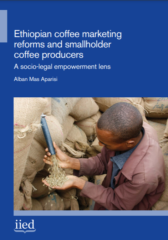
Coffee is Ethiopia’s main export crop, contributing to the livelihoods of more than 5 million smallholder farmers. However, these smallholders find themselves at the bottom of a long value chain that includes collectors, traders, processors and exporters.
In 2008, a marketplace, the Ethiopia Commodity Exchange (ECX), was launched with the aim of improving agricultural marketing and shoring up producer prices, and coffee trading through the ECX was made mandatory for all market participants except cooperatives and large plantations. But in 2017, following pressure from exporters, foreign importers and the donor community, further reforms again opened up coffee trading outside the ECX.
This report examines both these coffee marketing reforms, focusing specifically on the participation of and outcomes for smallholder coffee farmers. The aim is to assess spaces where smallholders and cooperatives may have been able to take part in the reforms, and to highlight policy implications for considering socio-legal empowerment of smallholders in such policy reform.
Download the report on the link below.

Rejoignez-nous sur
LinkedIn